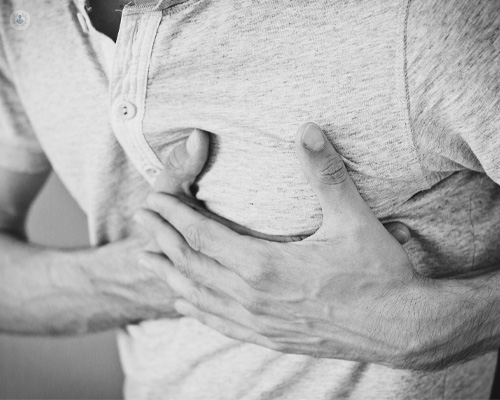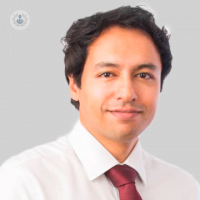Chest pain: when should I seek medical attention?
Written by:Chest pain is an extremely common occurrence, and, in some cases, can be a real cause for concern, particularly if you suffer from it while resting. In our latest article, esteemed consultant cardiologist, Dr Arjun Ghosh, reveals the most common causes of chest pain, reveals to what extent it is a sign of COVID-19, and tells us how people can know if their specific chest pain is a sign of perhaps something more serious.

What are the main causes of chest pain?
There are a number of different causes of chest pain. You have the heart in the centre of the chest and problems with the heart can cause chest pain. Alongside that, there are other potential causes, such as problems with the lungs, problems with the muscles, and problems with the ribs. All of these can potentially be causes of chest pain, alongside problems with the oesophagus or the food passage.
Is chest pain a sign of COVID-19?
Chest pain can indeed be a sign of COVID-19 in some rare cases, if a patient develops inflammation of the heart, which can rarely occur with COVID-19. That may manifest in the form of chest pain. Alongside that, there may be other symptoms, such as being short of breath, which could be related also to COVID-19 and its involvement in the heart.
Can chest pain be related to exercise?
It depends on whether the chest pain is a cardiac chest pain or not. If a patient has angina and if this is managed well, the patient shouldn't really be getting chest pain upon exertion. If the chest pain occurs with activity exercise, then I would suggest that you seek medical advice because it may mean that the treatment needs to be escalated.
Other causes of chest pain that can occur with exercise can, of course, be things like musculoskeletal pain. So, if you're exercising and if you're, say, running or lifting weights, you may strain some of the muscles and the ribs and the lining of the ribs during that activity.
How can patients know if their chest pain is a sign of something serious?
Normally, cardiac chest pain is something that occurs with activity or exertion. So, if you get chest pain when you are walking upstairs or if you're walking uphill or carrying heavy bags, that potentially could be directly related to or directly coming from the heart. Chest pain when you are sitting down watching TV or just at rest is less likely to be from the heart.
However, there are of course, some exceptions in all cases, and it's always better to have these checked by a medical practitioner to determine if it is a cardiac chest pain or not. As mentioned, there are other causes of chest pain, such as from the lungs, from the ribs, and/or from the stomach. All of these again could manifest in a variety of different ways.
How are the common causes of chest pain treated?
This depends on whether the chest pain occurs in an emergency context or not. So, if the chest pain starts and it does not resolve, you should seek emergency medical assistance by calling 999. If the chest pain is found to be due to the heart, it may be due to a blockage in one of the arteries of the heart, and this may be causing a heart attack.
In that case, what happens is that you are taken to a cardiac centre. After being given local anaesthetic, a tube is put up to the heart arteries and the blockage is removed and a stent is inserted. A stent is like a metal tube, which allows the blood to flow. All of this takes place under local anaesthesia. And of course, the patient is given pain relief as well.
Dr Arjun Ghosh is a highly experienced and esteemed London-based consultant cardiologist who specialises in chest pain. Book an appointment with him today via his Top Doctors profile if you are suffering from any symptoms outlined above.


